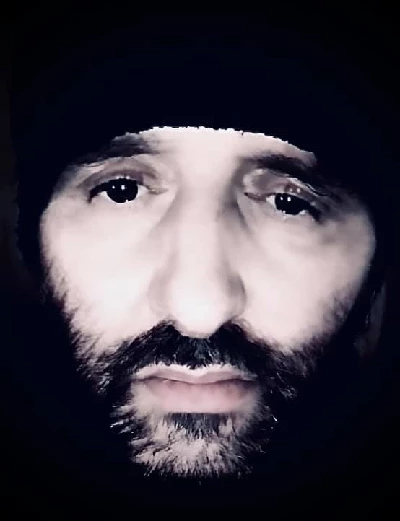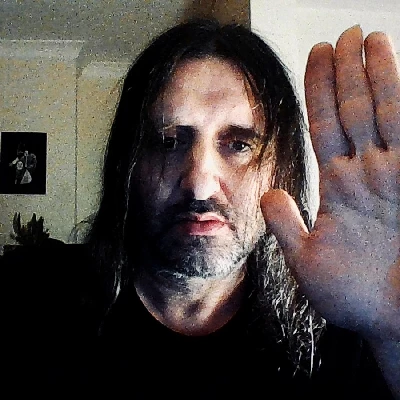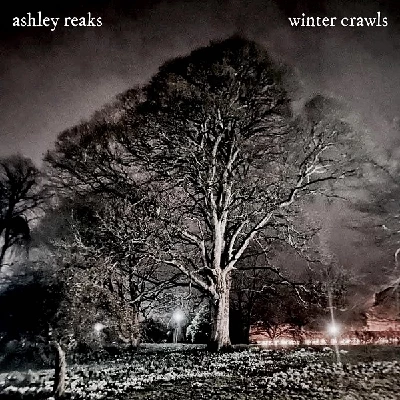published: 25 /
10 /
2023

Harrogate multi-talent Ashley Reaks just released ‘Winter Crawls,’ which includes a host of well-known guests, superb imagery and one-off instrumental work. He updates Lisa Torem with the back stories.
Article
The multi-faceted recording and visual artist Ashley Reaks was my first Pennyblackmusic interview subject. Luckily, I’ve had the opportunity to catch up with Ashley over the course of his career, and when doing so, I have stood in awe of his consistently, creative growth and unstoppable work ethic.
Ashley’s trajectory has included a world tour as a bassist with It Bites front man Francis Dunnery, engagement with electro-pop outfit Younger Younger 28, which culminated in a hit record, and worldwide visibility, as both a visual and conceptual artist and musician “from Berlin to Detroit.”
Impossible to pigeon-hole, Reaks has fearlessly ventured into post-punk, psychedelia, jazz, spoken word, semi-classical and folk with equal curiosity and passion. He has drawn comparisons to Robyn Hitchcock, Elvis Costello and Godley and Crème, among others, by Stereo Embers (USA).
The release of ‘Winter Crawls’, an arguably wistful, honest and exploratory album, opened the door for further conversation… Pennyblackmusic welcomes back Ashley Reaks.
PB: It’s great to catch up with you again Ashley. Let’s start by going back in time. How did you learn to play synth, bass and guitar? Did you grow up in a musical household?
ASHLEY REAKS: Yes. It was a very musical household. My mum and dad met in a band when they were seventeen and eighteen and played gigs together right up until my mum died at 84. Growing up in the late 1970s, there would be music in every room – my mum effortlessly playing ballads and standards from the 1940s and 1950s on the piano downstairs; my dad in his music room, playing tenor sax, along to his favourite mainstream jazz albums – my elder brother, who was the musical boffin of the house, would be hard at work transcribing classical music on his headphones in his bedroom, and I’d be in my room throwing shapes in the mirror whilst obsessively playing bass along to the Ramones live album, ‘It’s Alive’.
Punk rock allowed me to create and play in a band without much ability and within a few months, I’d formed my first band No Reality. The bass guitar is my natural instrument and the only one which I’d profess to have much ability on, but I discovered I had a naturally good musical ear and could distinguish roughly what the different instruments were doing.
Over time I used guitar and keyboards to work things out and come up with parts, some of which I can just about play myself with the help of modern recording techniques and some of which I get better instrumentalists in to play.
PB: Regarding ‘The Murmur of Things Devine,’ I love the evocative, dueling guitar parts in the introduction. These lines create a stunning underlayment for the synth. How did you sequence recording the guitar parts?
AR: The opening guitar riff had been around for ages and I find it hard not to start harmonizing everything, so, for a while, I just had a little four-part repeating loop that I’d use to distract my mind when making collages. Eventually I decided to start developing the riff and write a song around it. I demo everything up very obsessively, frantically and very, very badly sonically.
Dan Mizen (danmizen.com), who has recorded and mixed my last twelve albums always laughs when I bring my latest album demos into his studio to re-record properly as I record all my demos on the crappy mic on my laptop whilst watching TV, so we spent some time trying to identify what I was watching, as we can always hear it in the background. It’s invariably either football, true crime documentaries or chat shows. Occasionally, the sound of one of my snoring dogs makes an appearance.
Then we set about re-recording every single part ‘properly.’ It’s a laborious and time-consuming process but I like to drag the creative process for as long as possible, as that’s the bit I love. I also like hearing my appallingly badly recorded demos come to life in a good studio as I think it’s easy to spend too much time on the quality of demos, only to end up disappointed with the ‘proper’ recording. It’s another one of my psychological tricks I employ to keep myself interested and excited.
PB: On this same song, you paint a compelling portrait of a woman, something you have done well in previous albums, and you write with great detail about the main character: “Her skin folding and expanding…,” while you, as observer, remain in the background. “You can find me in the in-between spaces.” Moreover, with Lucy Mizen, you created a compelling duet. Had you and Lucy worked together previously?
AR: On the album I extended the collage/cut and paste approach to the lyrics, as well as the music, I’ve got books full of lyrical fragments and I trust the process enough to scan through them and pick a few that seem to belong together and mould a song out of them. I think because of our personal histories and individuality, we’ll always choose the images and (often inner) themes that speak to us.
As you say, one of mine seems to be a detached male observer and narrator painting a portrait of a female in great detail. It’s not one I’d choose and is an uncomfortable dynamic to realize is in my DNA, but it is what it is. Even when I try to pick random and abstract images, the same deep and often unconscious themes emerge. Paraphrasing badly (one of my favourite hobbies), I remember one of those existentialist writers (Camus or Kafka probably) saying that all artists return to the same couple of images that got burned into their subconscious at an early age. I tend to agree.
Lucy Mizen (https://tinyurl.com/2df3fnzh) is Dan’s wife and has sung on a few of my albums, starting with 2010’s ‘Here’s to the Good Life’. My other long-term vocal contributor Maria Jardardottir moved back to her home country of Norway so wasn’t available to perform on ‘Winter Crawls.’
Lucy did a great job on the album, especially as it’s got awkward and competing time signatures. Dan’s dad Frank (aka Uncle Bastard), who very sadly died during the pandemic, was a musical legend in my town of Harrogate. Frank played on a few of my albums and was a hugely talented and inspiring multi-instrumentalist and composer. Amongst his many sessions over the years were stints as trombone player for both the Jackson 5 and The Commodores, as well as for providing the bass on Carl Douglas’s one-hit wonder ‘Kung-Fu Fighting.’
PB: In contrast, ‘Winter Crawls’ makes a forceful statement with a progressive rock vibe. You allow more space for instrumental work. Regarding the theme, did you conceptualize “winter” as being a metaphor for something more abstract?
AR: Again, I had a fragment for ages. The lyric “Winter crawls/the raging plague” which used to bug me and became an annoying earworm I couldn’t get rid of, so eventually, I let it speak. It goes back to 2017/2018 and was the song (there’s always one) that I didn’t think would make the final cut, but I was committed to persevering and completing it regardless. Then the pandemic happened, and the lyric seemed more relevant and gave some kind of shape to the whole album and provided the title.
I often use winter as a metaphor for my sometimes-bleak inner world and the emotional wilderness I grew up in. It’s both painfully familiar but also strangely comforting, like sitting round a warm fire after trudging through the snow for hours. I’m pretty much resigned to it being my chosen landscape. However much I try, I end up making art in black and white and writing songs in minor keys. I’m accepting of that these days—there’s plenty to explore and there’s a lot more beauty there than it seems initially.
PB: How did you arrange the backing vocals and harmonies in general? Were they notated before you recorded or did the singers come up with original parts?
AR: All the vocals were written before we recorded; Lucy’s part, all sung very quietly and badly by me in a strangled falsetto in the early hours. Nobody needs to hear my demos.
PB: ‘Fundamentally Christ-Like’ hinges on a series of instrumental sections. At times, your bassline is prominent, but Joel Purnell’s saxophone and Nick Dunne’s electric guitar also make a strong appearance,
AR: Sax player Joel Purnell (joelpurnell.com) ‘is an internationally recognized and critically acclaimed saxophonist, widely considered as one of the UK’s leading contemporary jazz musicians and educators. Purnell’s prolific performance and studio career has led to an expansive discography, appearing and recording with a multitude of highly respected bands and musicians. He has also held the post of Principal Lecturer at Leeds Conservatoire for over twenty years, mentoring several generations of the UK’s most talented new jazz musicians’ (taken from Joel Purnell’s website).
Drummer Rob Hirons (robhirons.com) lives in Marseilles in France. Rob plays in numerous bands, teaches and does sessions and drum clinics. We have a shared love of odd time signatures and the drumming on David Bowie’s ‘Blackstar’ album.
Guitarist Nick Dunne (https://tinyurl.com/mpkj6xa5) is from my hometown of Harrogate. He is a superb piano and violin/viola player, as well as a prolific composer and teacher . We used to play together in a spoof 1970’s glam band years ago, called Roger Scorpio and the Children of Love.
PB: On ‘One of God’s Aliens,’ you sing, “I’m a river floating upstream,” but counter that line with, “I’m a foreigner in my own world.” Was the idea to juxtapose nature with human identity?
AR: I read once that some writers and artists are “scavengers for metaphors.’” I’ve wanted to get away from the literal ‘story’ way of writing I’ve used for years, and instead use fragments of imagery that create general tone or feeling, more like I do in my collages.
Within this, I’ll always gravitate to the images that resonate with my psyche and inside story, regardless of the source material. At the time I was reading large amounts of modern nature books which I think would be classified as ‘psychogeography’, which is a vague term, but one that appealed to my love of both nature and psychology, as well as my compulsion to find new ways to express my teeming inner life. I’m not sure if I ended up with anything coherent lyrically but I liked the conveyor belt of images as they flashed across the songs,
PB: I detect both darkness and light in “Homesick Home’: “Terror in the very marrow of my bones” versus “Love gushing like a waterfall.” The title, too, is ambiguous, Can you elaborate?
AR: Many years ago, I was reading a book by American “inner child” therapist John Bradshaw (either ‘Homecoming’ or ‘Healing The Shame That Binds’). He said that children from a particular kind of dysfunctional and emotionally deprived home recognized a family-system of loneliness that he described as “homesick at home”, similar in my mind to Dylan’s “no direction home”’. I related strongly – I’m currently in my 81st address since getting kicked out of home at age 15.
“Terror in the very marrow of my bones” is a very real physical and emotional part of the CPTSD I live with on a daily basis as a result of childhood abuse. With CPTSD feelings are often heightened and magnified—anxiety doesn’t do justice to what I often experience, but terror does. “Love gushing like a waterfall” was the first line of the original middle eight where I was going to describe my desired opposite home and sense of safety but, as I often do, I abandoned it and just kept the incongruous first line,
PB: How long did it take you to record the material on ‘Winter Crawls’?
AR: ‘Winter Crawls’ was a long time in the making. After putting out two albums a year for the last few years this one took five years from writing to completion. The bones of the writing was done in a short two week burst in 2018.
It then got derailed and delayed by a traumatic and unexpected divorce which ended up with me and my two dogs taking refuge in a motorway motel for six weeks before returning to my hometown two-hundred miles away to lick my wounds.
Then the Covid pandemic struck, coinciding with a major decline in my health which left me bedbound for about eighteen months, so it was 2022 before I eventually began recording the bulk of the album and we finally got it mixed in 2023 – phew!
PB: If you had to condense the theme of the album into a few sentences, what would you say?
AR: Navigating my way out of a long and dark night of the soul (again).
PB: Is the subject in ‘She Picks It Up and Sniffs’ a victim of abuse?
AR: Yes. The lyrics were cut ups and fragments from various sources, but all pertained to an abuse victim who was stuck between a feeling of powerlessness, and of taking revenge (“Touch yourself, I command!”). The lyrics sound and feel unsettling, and they suggest something ominous and unnamed which is barely contained in the victim’s body and soul.
PB: Regarding your lyric writing, do you have certain times of the day when you enjoy writing? Do ideas come at your beck and call or when you least expect them?
AR: I’ve got better over the years at grabbing and preserving lyrical fragments as they appear, which can be anytime. Having said that, it’s often the quiet time after a period of busyness when ideas and lyrics come, when I’m in the bath mainly or walking, both of which I spend a lot of time engrossed in. I’m a long-term night owl so, try as I may to get into better habits, I tend to find myself working mostly in the early hours of the morning.
PB: Are you currently performing or primarily recording new material?
AR: The pandemic and health issues have put paid to my live performances. After thirty years of playing one-hundred-and fifty gigs a year it’s taken a bit of getting used to, especially as it was how I paid the rent, but I manage – just. I haven’t done a gig since two days before the first Covid lockdown here in the UK in March 2020.
PB: Do you ever dream lyrics?
AR: No, but I tend to live life like a waking dream (probably a childhood trauma response) and am always plugged into the imaginative, childlike and dreamlike part of me – it’s reality I find hard. When I hear an artist complain of ‘writer’s block,’ I wish I could swap them their block for my never-ending stream of inner noise and images that very rarely let up. I remember both Salvador Dali and Captain Beefheart saying something along the lines of “I don’t need drugs, I AM drugs” – I relate.
PB: How are your other artist-inspired projects coming along?
AR: I make collages prolifically – it’s over 2,000 I have now and that’s after starting again after throwing out all my art in a moment of madness in 2002. I have a few collectors and buyers, some of whom are artists and musicians from the late 1970’s/early 1980’s post-punk scene which is gratifying as that’s where the inspiration to do them came from.
I designed the sleeve for the last single by veteran LA punks, The Dickies, whose singer Leonard Phillips is a friend and occasional musical collaborator. Some of my art is at https://ashleyreaks.bigcartel.com
I’ve six (!) albums written, demoed up and ready to be recorded when finances allow, though I’m 75 % of the way through the next one, another proggy affair, provisionally titled ‘No Place in the Nature of Things’.
I’m also working on two books, which are almost complete. One is a fun set of anecdotes and stories of my life as a gigging musician for thirty years, a lot of which was at the lower reaches of the music business, and which tended to provide the most ridiculous and hilarious tales.
The other book is a different kettle of fish altogether, a memoir of the prolonged abuse I suffered as a child at the hands of my narcissistic dad, the ongoing consequences of that and how it shaped my life.
PB: If you could be a super hero, what would be your power?
AR: I imagine most people would want a superpower that they lack in their real life, so in an ideal world I would have a Zen-like sense of emotional balance and calmness rather than the generalized sense of trauma and panic that’s been seared into my DNA from an early age. I can but dream!
PB: Thank you.
Band Links:-
http://www.ashleyreaks.com/
https://twitter.com/ashleyreaks
http://ashleyreaks.bandcamp.com/
https://www.facebook.com/ashleyreaksar
https://www.instagram.com/ashleyreaks/
https://www.youtube.com/user/ash231266
Have a Listen:-
Picture Gallery:-

